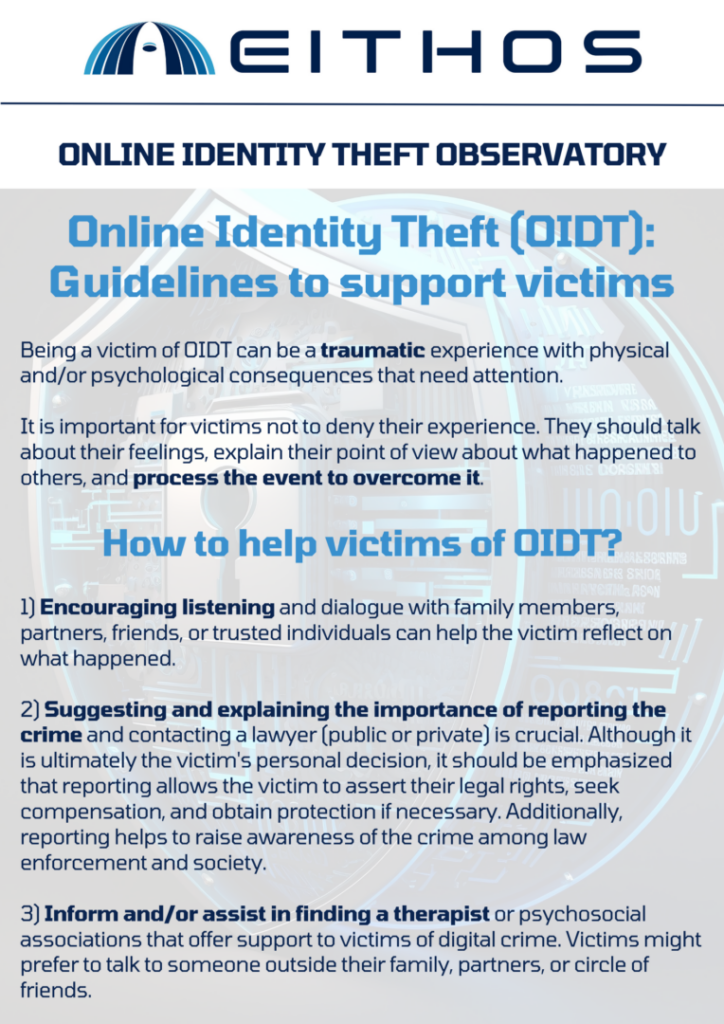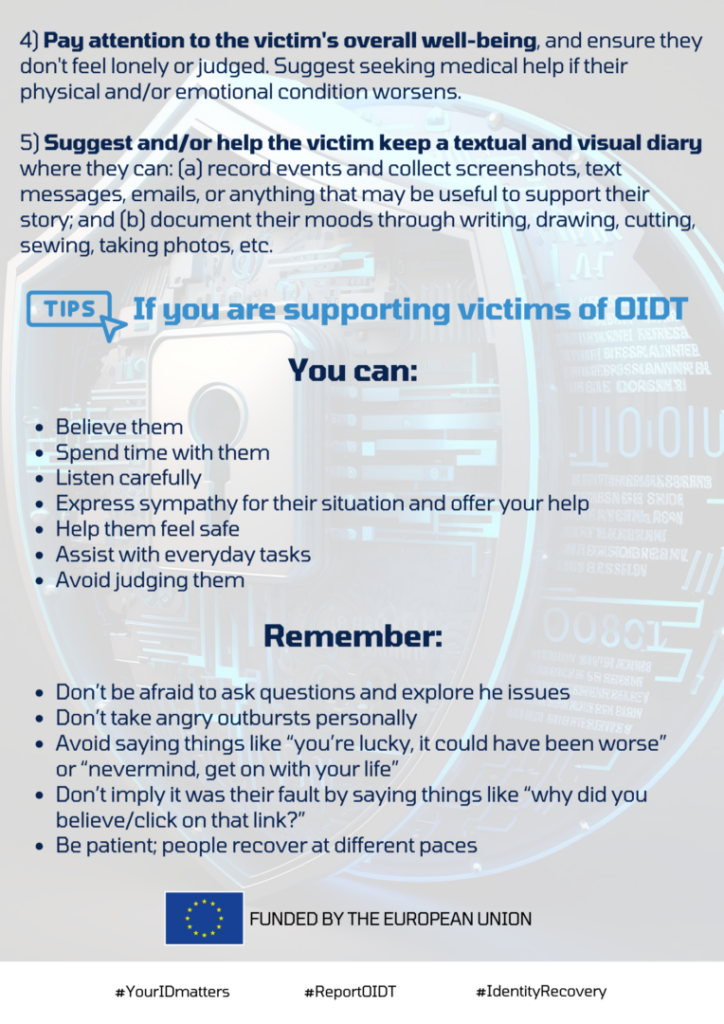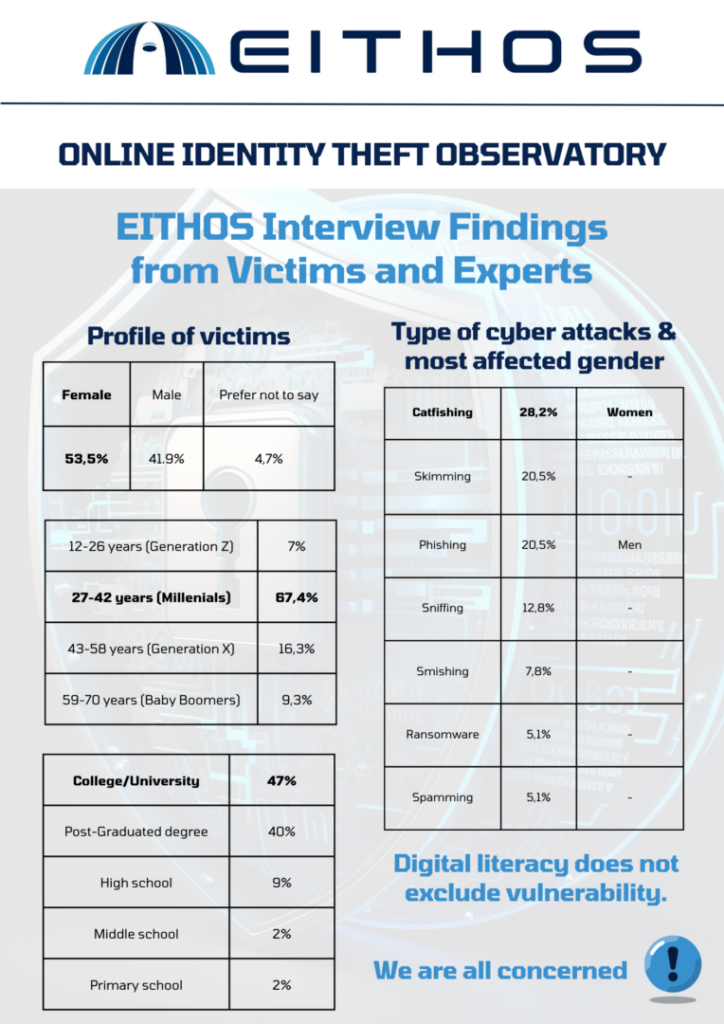Victimology, the study of victims and the psycho-social effects of their victimization, plays a crucial role in understanding Online IDentity Theft (OIDT).
This dimension encompasses various aspects, including the characteristics of victims, the impact of the crime on individuals, and the broader social implications.
Specifically, some key points to consider regarding the victimology dimension are:
1. Characteristics of Victims
Socio-demographic factors: victims of OIDT can vary widely in age, gender, socioeconomic status, and education level. Certain groups, indeed, may be more vulnerable.
Psychological factors: victims may have varying levels of awareness about online security, which can influence their vulnerability. Furthermore, the defense mechanism such as coping strategies may be an obstacle to elaborate and deal with the damage suffered.
2. Types of Victimization
Direct victimization: this occurs when an individual’s personal information is stolen and misused, leading to financial loss or reputational damage.
Indirect victimization: family members, friends, or employers may also be affected by the theft of a single individual’s identity, leading to broader implications.
3. Impact of Identity Theft on Victims
Emotional consequences: victims often experience feelings of violation, anxiety, and helplessness. The emotional mood can be significant, leading to stress and depression.
Financial consequences: victims may face substantial financial setbacks, including costs associated with resolving fraudulent charges, legal fees, and lost wages due to time spent managing the aftermath.
Reputation consequences: Identity theft can lead to long-lasting damage to a victim’s reputation, particularly if their information is used for unfair, pornography and criminal activities.
4.Victim Response and Recovery
Reporting and Support: many victims hesitate to report identity theft due to shame, fear of not being believed, or a belief that nothing can be done. Awareness and education are crucial to encouraging victims to seek help.
Victim Support Services: access to resources such as identity theft recovery services, legal assistance, and counselling can help victims navigate the aftermath of identity theft.
Prevention and Education: empowering potential victims through education about online safety measures can be a proactive approach to reducing the incidence of identity theft.
5. Societal and Legal Considerations
Legislation: understanding the legal framework surrounding identity theft is essential for protecting victims. Laws vary by jurisdiction, and advocacy for stronger protections is vital.
Public Awareness Campaigns: increasing awareness of identity theft and its impact on victims can help foster a culture of prevention and support for those affected.
6. Long-term Effects
Chronic Victimization: some individuals may experience repeated incidents of identity theft, leading to a cycle of victimization that can exacerbate emotional and socilal distress.
Social Isolation: the stigma associated with being a victim of identity theft can lead to social withdrawal and isolation, further affecting the individual’s mental health and well-being.
In summary, the effects of online identity theft on victims are multifaceted and can have lasting consequences on their emotional well-being, financial stability, social relationships, and overall quality of life. The victimology dimension of online identity theft highlights the complex interplay between individual experiences, societal factors, and the need for effective support systems. Within the EITHOS project, the focus is to understand these dimensions can inform better prevention strategies, legal protections, and victim support services.
Our Articles
Our webinars
Other initiatives
RAYUELA: a fun way to fight cybercrime
The RAYUELA GAME is a unique tool designed to educate and empower young people about the risks and benefits linked to the use of the Internet. The game mirrors the project’s main goal, firstly, to better understand the drivers and human factors affecting certain aspects of cybercriminal behavior and, ultimately, contribute to the prevention, detection, and mitigation of the considered cybercrime.
Players begin the game by creating their avatars and discovering the game’s main plot. However, each storyline differs based on the player’s decision-making capabilities to react to different risk situations they may encounter online.
Use our guidelines




Related Posts
Keys and Clues to Childhood in the Digital Ecosystem
During our event on September 2nd, the NGO EDUCO presented its work; here is its contribution. “I don’t like it when he gets aggressive when
What is the perception of social risk related to Online IDentity Theft?
We live digitally immersed, connected to an invisible network that accompanies us in every daily gesture: from online shopping to digital signatures, from bank account
The socio-emotional impact on Online Identity Theft (OIDT) victims
In today’s digital age, Online IDentity Theft (OIDT) is a growing concern affecting millions of people worldwide. As users, we directly generate data – related
Cybersecurity has no age
2 workshops, full of experience and key learnings made at the University of Macerata, for juniors and seniors, by Annalisa Plava, Ph.D. Workshop with retirees
